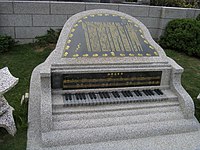| This article needs additional citations for verification. Please help improve this article by adding citations to reliable sources. Unsourced material may be challenged and removed. Find sources: "Bai Guang" – news · newspapers · books · scholar · JSTOR (January 2022) (Learn how and when to remove this message) |
| Bai Guang | |||||||||||||||
|---|---|---|---|---|---|---|---|---|---|---|---|---|---|---|---|
 Bai Guang in 1949 Bai Guang in 1949 | |||||||||||||||
| Born | Shi Yongfen (史永芬) (1921-06-27)27 June 1921 Zhuozhou, Republic of China | ||||||||||||||
| Died | 27 August 1999(1999-08-27) (aged 78) Kuala Lumpur, Malaysia | ||||||||||||||
| Burial place | Nirvana Memorial Park, Semenyih, Malaysia | ||||||||||||||
| Occupation(s) | Actress, singer | ||||||||||||||
| Years active | 1943–1959 | ||||||||||||||
| Spouse |
Yan Lianglong (m. 1969) | ||||||||||||||
| Musical career | |||||||||||||||
| Origin | Shanghai, China | ||||||||||||||
| Genres | Shidaiqu, Mandopop | ||||||||||||||
| Musical artist | |||||||||||||||
| Chinese name | |||||||||||||||
| Chinese | 白光 | ||||||||||||||
| |||||||||||||||
Shi Yongfen (Chinese: 史永芬; pinyin: Shǐ Yǒngfēn; 27 June 1921 – 27 August 1999), known professionally as Bai Guang (Chinese: 白光; pinyin: Bái Guāng; lit. 'White Light'; also credited as Pai Kwong, Bai Kwong and Bai Kwang), was a Chinese actress and singer. By the 1940s, she became one of the Seven Great Singing Stars.
Early life
Shi Yongfen was born in 1921 in Zhuozhou, Hebei. Her father was a quartermaster under general Shang Zhen. In her early years, she was a student of the Beiping Salon Theatrical Troupe (北平沙龍劇團; Běipíng Shālóng Jùtuán), and once performed Cao Yu's play Sunrise. In 1937, she studied at the University of Tokyo's music department until World War II in 1942. After drama school, she wanted to be a movie star. As she proclaimed, she wanted to be like the beams of light coming off the movie projectors onto the big screen; hence her stage name.
Career
Her mandopop songs were often used in many of her movies as soundtracks. In an age and culture where light, higher voices were usually favored, she had a slightly deep and hoarse voice, which helped her become a big star in Shanghai. People called her the "Queen of the Low Voice" (低音歌后).
Bai's big screen career started in 1943. She was known for playing seductive roles due to her flirtatious image on screen and has also played villains at times. She lent a more dramatic tone or sexy attitude to her songs. Some of her hits were "Autumn Evening" (秋夜), "Without You" (如果沒有你), "The Pretender" (假正經), "Revisiting Old Dreams" (魂縈舊夢), and "Waiting For You" (等著你回來).
After the war, Bai Guang moved to Hong Kong and joined Great Wall Pictures. In 1949, A Forgotten Woman (蕩婦心) was shown in Hong Kong. Even the governor, Alexander Grantham, went as a fan.
By 1950, Bai, tired of the low-quality films, retired as an actress in China. After marrying an American GI in 1951, she moved to Japan and successfully opened a nightclub in Tokyo's Ginza district in 1953. The union did not last, and she returned to Hong Kong, recording some music through 1959 when she officially retired. In 1969, she resettled in Kuala Lumpur, Malaysia, where she married a man 20 years her junior named Yan Lianglong (颜良龙; 顏良龍), who was also one of her fans. She performed to wide acclaim in 1979 in Kaohsiung, Taiwan. Her last public appearance was in 1995 on Hong Kong's TV top 10 Chinese singing awards.
Death


Bai Guang died from colon cancer on 27 August 1999, at the age of 78, in her house at Kuala Lumpur's Damansara Heights suburb. She was buried at the Nirvana Memorial Park, Semenyih.
Filmography
- Love Peas of Southland (紅豆生南國) (1943)
- The Fire of Love (戀之火) (1945)
- Sinister House #13 (十三號凶宅) (1947)
- Spy Ring 626 (六二六間諜網) (1948)
- Blood Stained Begonia (血染海棠紅) (1949)
- A Forgotten Woman (蕩婦心) (1949)
- Songs in the Rainy Nights (雨夜歌聲) (1950)
- A Strange Woman (一代妖姬) (1950)
- Hours Passed the Wedding (結婚廿四小時) (1950)
- Smiling Rose (玫瑰花開) (1951)
- Tears of Songstress (歌女紅菱艷) (1953)
- Fresh Peony (鮮牡丹) (1956)
References
- Peony (1956) film poster at IMDb.com. Retrieved 1 July 2019.
- 1964 Singaporean EP cover at Discogs.com. Retrieved 1 July 2019.
- Autumn Nights album cover at Discogs.com. Retrieved 1 July 2019.
- 魏君子 (2019-05-01). 光影裏的浪花:香港電影脈絡回憶 (in Chinese). 中華書局(香港)有限公司. ISBN 978-988-8572-49-6.
- ^ 尤静波; 李罡 (2015-09-01). 中国流行音乐简史 (in Chinese (Taiwan)). Beijing Book Co. Inc. ISBN 978-7-5523-0844-0.
- "上海老歌星人物譜:一代妖姬 白光". 2018-12-26.
- Baidu. "Baidu Archived 2007-03-12 at the Wayback Machine." Bai Guang. Retrieved on 2007-04-28.
- Music Sogua. "Music Sogua Singer profile Archived 2007-09-29 at the Wayback Machine." Bai Guang. Retrieved on 2007-04-28.
- ""darling,我来看你了".痴情郎情人节墓前探爱妻". 星洲网 Sin Chew Daily. Retrieved 2024-05-15.
- 謝其章 (2010-05-01). 都門讀書記往 (in Chinese (Taiwan)). 秀威出版. ISBN 978-986-221-439-8.
- 吴剑 (2010-04-01). 何日君再来——流行歌曲沧桑史话(1927-1949) (in Chinese). Beijing Book Co. Inc. ISBN 978-7-5317-2450-6.
External links
- Bai Guang at IMDb
- Bai Guang songs online
- Bai Guang movie: A Forgotten Woman on YouTube
- Bai Guang Reminiscence of The Past on YouTube
- Bai Guang: Waiting for you on YouTube
- Actress at China's Movie Database